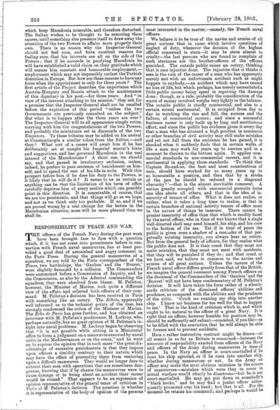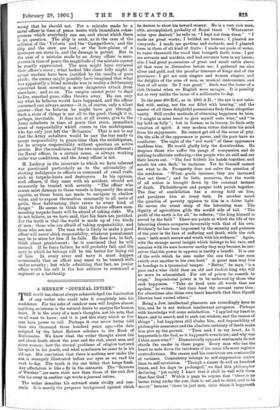RESPONSIBILITY IN PEACE AND WAR.
THE officers of the French Navy during the past week have been brought face to face with a question which, if it has not come into prominence before in con- nection with French naval manoeuvres, has at least pro- voked a good deal of astonished and angry comment in the Paris Press. During the general manoeuvres of a squadron, we are told by the Paris correspondent of the Times, two battleships, the • Gaulois ' and the Bouvet,' were slightly damaged. by a collision. The Commanders were summoned before a Commission of Inquiry, and by. the Commission, as also by the Admiral commanding the squadron, they were absolved from blame. M. Pelletan, however, the Minister of Marine, took quite a different view of the affair, and relieved both officers of their com- mend. M. Pelletan.'s decision has been received in Paris, with something like an outcry. The Debate, apparently well informed as to the technical points of the case, has strongly condemned the action of the Minister of Marine. The Echo de Paris has gone further, and has obtained an interview with M. Pelletan's predecessor, M. Lockroy, who, perhaps naturally, has no great opinion of M. Pelletan's in- sight into naval problems. M. Lockroy began by observing that "it is not possible while sitting in a Ministerial" office to form a judgment on a manoeuvre executed by naval units in the Mediterranean or on the ocean," and he went on to express the opinion that in such cases " the great dis- advantage of excessive punishments is that they impose upon officers a timidity contrary to their nature, which may have the effect of preventing them from venturing upon a difficult manoeuvre. They would no longer dare to entrust their men with operations that are sometimes dan- gerous, knowing that if by chance the manoeuvres were to cause damage or to bring about an accident their career would be ruined." That appears to be an expression of opinion representative of the general tenor- of criticism" in Paris of M. Pelletan's decision. The question is whether it is representative of the body of opinion of the persons most interested in the matter,—namely, the French naval officers.
We believe it to be true of the navies and armies of all great nations that in cases which involve questions of neglect of duty, whenever the decision of the highest official concerned is stern—it may be stern almost to cruelty—the last persons who are found to complain of such sternness are the brother-officers of the officers punished. The outside public raises an outcry, thinking that it sees injustice done. The injustice that it thinks it sees is the ruin of the career of a man who has apparently merely met with an unfortunate accident such as might happen to anybody,—an accident which may have caused no loss of life, but which, perhaps, has merely necessitated a little public money being spent in repairing the damage done ; though, as a rule, probably the consideration of the waste of money involved. weighs very lightly in the balance. The outside public is chiefly commercial, and also to a certain extent sentimental. It is occupied from day to day in watching the rise and fall, the success and the failure, of commercial careers ; and since a successful business career is only built up by long and meritorious effort, and since the public has evidence given it every day that a man who has attained a high position in commerce or other branches of civil activity may still make mistakes and yet not fall from the eminence he has gained, it is shocked when it suddenly finds that in certain walks of life a man may work for years up to success and in a moment be thrown to the bottom again. It applies com- mercial standards to non-commercial careers, and it is sentimental in applying those standards. To think that Captain So-and-so,. the best and most conscientious of men, should have worked for so many years up to so honourable a position, and then that by a ' stroke of the pen he should be reduced to a disgraced obscurity ! '—that is the almost inevitable comment. A nation greatly occupied with commercial pursuits hates one idea above all others, and that is the idea, of in- security of tenure of office. What it does not realise, or rather, what it takes a long time to realise, is that in certain branches of national activity tenure of office must in the nature of things be insecure. There cannot be greater insecurity of office than that which is readily faced by the naval officer, who in time of war knows that a single well-directed shell may send himself, his ship, and his crew to the bottom of the sea. Yet if in time of peace the public is given even a shadow of a rem:nder of that per- petually existing insecurity, you always hear an outcry. Not from the general body of officers, for they realise what the public does not. It is their creed that they must not make mistakes, that they must not meet with accidents, that they will be punished if they do; and that creed, as we have said, we believe is common to the navies and armies of all great nations. 'Unless the nature of the French naval officer differs greatly from that of the British, we imagine the general comment among French officers on the dismissal of the Commanders of the • Gaulois ' and the 'Bouvet' will not have been condemnatory of M. Pelletan's decision. It will have taken the form rather of a silently made criticism of the dismissed officers' abilities and prudence, as compared with the abilities and the prudence of the critic. Catch me running my ship into another ship. I know my business far too well for that to happen to me.' That is the kind of criticism which is, and which ought to be, natural to the officer of a great Navy. It is right that an officer, however humble his position may be, should be sufficiently self-reliant—conceited, if you like—as to be filled with the conviction that he will always be able to foresee and to prevent accidents.
Here a rather instructive contrast might be drawn—at all events in so far as Britain is concerned—between the measure of responsibility exacted from officers of the Navy and officers of the Army during manoeuvres in time of peace. In the Navy an officer is court-martialled if he runs his ship aground, or if he runs into another ship, whether during manoeuvres or not. In the Army an officer may make the most obvious mistakes in the course of 'manceuvres—mistakes which were they to occur in actual .warfare would clearly be disastrous—but he is not court-martialled. He may get put down in somebody's "black books," and he may find a junior officer subse- quently promoted. over his head • but that is all. For the moment he retains his command; and perhaps it would be wrong that he should not. For a mistake made by a naval officer in time of peace meets with immediate conse- quences which everybody can see, and about which there is no question. The ship is sunk, as in the case of the collision of the Victoria' and the Camperdown,' and the ship and the crew are lost ; or the bow-plates of a destroyer are stove in, and the damage is patent. But in the case of a mistake made by an Army officer in man- oeuvres in time of peace the magnitude of the mistake cannot be exactly appreciated. The men might have retrieved their officer's error ; what looked like sheer folly might in actual warfare have been justified by the results of pure pluck; the enemy might possibly have imagined that what was apparently a blind mistake was in reality a deliberately conceived feint covering a more dangerous attack from elsewhere ; and so on. The umpire cannot point to dead bodies, smashed guns, rifles thrown away. He can only say what he believes would have happened, and the officer concerned can always answer—it is, of course, only a silent answer—that he believes he might have got through. Such a state of things is not all to the good, though it is, perhaps, inevitable. It does not, at all events, give to the Army subaltern in time of peace that stern, immediate sense of responsibility which comes to the midshipman who has only just left the Britannia.' That is not to say that the Army subaltern would be any the less ready to accept responsibility in peace-time than the midshipman, for he accepts responsibility without question on active service. But the conditions of the two careers are different ; the Naval officer, in a certain sense, is always working under war conditions, and the Army officer is not.
M. Lockroy in the interview to which we have referred was questioned particularly as to the advisability of showing indulgence to officers in command of small craft, such as torpedo-boats and destroyers. In his opinion, such officers, if they meet with an accident, should not necessarily be treated with severity. " The officer who causes most damage to those vessels is frequently the most capable, as those boats are made to navigate in shallow water, and to expose themselves constantly to all sorts of perils, thus habituating their crews to every kind of danger." He seems to think that in future officers com- manding torpedo-boats will be afraid of taking risks. We do not believe, as we have said, that his fears are justified. For the truth is that the world is made up of two kinds of men : those who are afraid of taking responsibility. and those who are not. The man who is likely to make a good officer will never shirk responsibility, whatever pu'nishment may be in store for him if he fails. He does not, in fact, think about punishment ; he is convinced that he 'will succeed. If he fears failure, he will probably fail, and the navy to which he belongs will be the better for being rid of him. In every army and navy it must happen occasionally that an officer may seem to be treated with undue severity ; but while admitting that fact, no junior officer worth his salt is the less mixious to command a regiment or kbattleship.











































 Previous page
Previous page